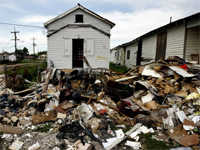- Real Truth Magazine Articles
- ANALYSIS
 Two Years After Katrina
Two Years After Katrina
Subscribe to the Real Truth for FREE news and analysis.
Subscribe NowApproximately 12,000 people in New Orleans—4% of the city’s 302,000 residents, or 1 in 25—are homeless. Prior to Hurricane Katrina, which struck America’s Gulf Coast in September 2005, New Orleans’ homeless population was about 6,300.
Today, “the city that care forgot” has four times as many homeless people as most U.S. cities.
According to UNITY for Greater New Orleans, an advocacy group, the surge in homelessness is due to four major factors:
Low-income residents returned to the city after evacuating it to escape Katrina, only to find they could not afford housing. “Since the storm, fair-market rent for an efficiency apartment has risen from $463 to $764” (Associated Press).
Other residents “slipped through the cracks of the federal system designed to provide temporary housing after the storm” (USA Today).
Out-of-town workers came to New Orleans for employment during the post-Katrina boom of rebuilding the city, but later lost their jobs.
Mentally ill residents and drug addicts no longer have the number of outreach centers and services that were available prior to Katrina. Many of the city’s homeless centers and public mental health facilities have closed. So has Charity Hospital, which housed the main public psychiatric ward in New Orleans.
The New Orleans Mission, one of the city’s main homeless shelters, has a 150-person limit, which fills each day. In pre-Katrina New Orleans, most mission residents were “chronically homeless and typically jobless” (USA Today). Today, about four in ten work fulltime jobs, yet cannot afford rising rents.
After the 2005 hurricane barreled through New Orleans, the levees broke due to pressure from the storm surge. Floodwaters submerged about 80% of the city, destroying 200,000 homes and 41,000 affordable rental units.
Currently, plans for rebuilding the city call for demolishing four major public housing developments, consisting of 4,500 units. These are to be replaced with mixed-income housing: “…more than 3,200 public housing units and another 1,765 affordable housing units that would service families at or below 80 percent of the area median income,” according to the Housing Authority of New Orleans. “The plan also includes another 1,800 single families that would be market rate and affordable.”
Federal and local officials support razing the four developments, stating that less public housing is needed due to the city’s decreased population. But public housing advocates counter that the plan will only create more homelessness.
From the midst of New Orleans’ housing troubles has come a new term: “homeless homeowners.” These are residents who had paid off their mortgages, but did not have insurance when Hurricane Katrina struck. With their houses destroyed, the owners were left homeless.
HUD—U.S. Housing and Urban Development—announced that New Orleans would receive $27.6 million to produce affordable housing for low-income families, assist first-time homebuyers in purchasing single-family homes, and provide transitional housing for those in need, with the goal of helping the homeless gain permanent housing.
 Two Years After Katrina
Two Years After Katrina